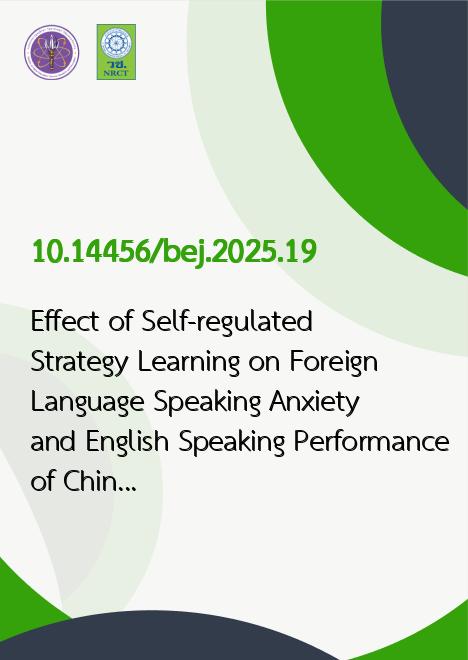
|
Effect of Self-regulated Strategy Learning on Foreign Language Speaking Anxiety and English Speaking Performance of Chinese Undergraduate Students |
|---|---|
| รหัสดีโอไอ | |
| Creator | Yujia Chen |
| Title | Effect of Self-regulated Strategy Learning on Foreign Language Speaking Anxiety and English Speaking Performance of Chinese Undergraduate Students |
| Contributor | Sumalee Chinokul |
| Publisher | Ph.D. Program in English Language Teaching (ELT), Faculty of Humanities and Social Sciences, Buriram Rajabhat University |
| Publication Year | 2568 |
| Journal Title | BRU ELT JOURNAL |
| Journal Vol. | 3 |
| Journal No. | 3 |
| Page no. | 284-304 |
| Keyword | Self-regulated learning, foreign language speaking anxiety, English speaking performance, Chinese undergraduate students, self-regulated learning strategy |
| URL Website | https://so14.tci-thaijo.org/index.php/bru_elt_journal/index |
| Website title | https://so14.tci-thaijo.org/index.php/bru_elt_journal/article/view/2164 |
| ISSN | 2822-1311 |
| Abstract | This study examined the effects of self-regulated learning (SRL) strategies on foreign language speaking anxiety (FLSA) and English speaking performance among Chinese undergraduate English majors. Employing a single-group pretest-posttest design, fifty second-year English majors from a university in Jilin Province participated in an 8-week SRL intervention integrated into regular speaking courses. The intervention targeted goal-setting, self-monitoring, positive self-talk, and independent practice. Data were collected via a modified Foreign Language Speaking Anxiety Scale (FLSAS), picture-description speaking tests, and a Likert-scale questionnaire. Paired-sample t-tests demonstrated significant reductions in FLSA and notable improvements in speaking performance post-intervention. Participants also reported enhanced confidence, fluency, and learning motivation. These findings indicate that integrating SRL strategies into language instruction can effectively mitigate speaking anxiety and improve oral proficiency. The study contributes to the understanding of learner autonomy in second language acquisition and emphasizes the value of context-sensitive approaches in addressing language learning barriers in non-Western contexts. |